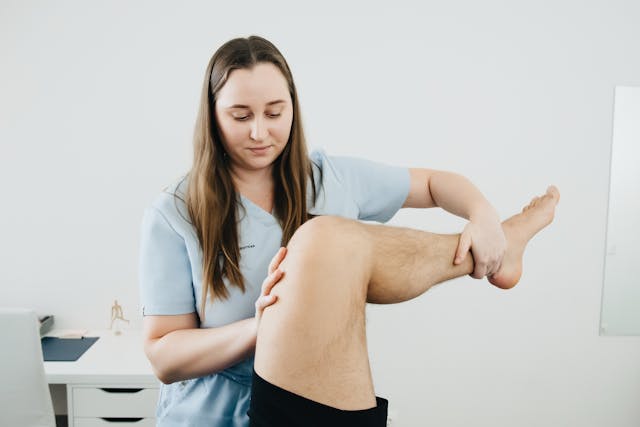You can stop varicose veins from getting worse by getting a professional diagnosis and treatment plan from a vascular specialist. Medical treatment seeks to alleviate symptoms and prevent complications, such as bleeding, skin ulcers, and blood clots. Here’s a look at how to stop your condition from getting worse:
Seek Medical Treatment
If your varicose veins cause pain and discomfort, seek medical intervention as soon as possible. The condition can cause aching pain, itching, and burning sensations. Veins close to the skin’s surface are also more vulnerable to cuts and heavy bleeding in case of an injury. Other risks include blood clots that cause deep vein thrombosis. Such clots can be fatal if left untreated. To prevent the condition from worsening, speak to a vascular specialist for immediate therapy. Treatments include sclerotherapy and endovenous ablation. Sclerotherapy uses a saline-based solution injected into your veins to reduce bulging and diffuse clotting blood. The therapy is done once or multiple times and is accompanied by wearing compression stockings for a couple of weeks.
Endovenous ablation is a minimally invasive outpatient procedure used to close your vein and prevent the symptoms of venous insufficiency from worsening. The procedure uses heat produced from lasers or radiofrequency energy and involves mild sedation. A needle and wire are inserted through a catheter and used to transmit the heat energy to your vein, eliminating the need for an incision. The heat causes the targeted vein to constrict and close. Endovenous ablation treatment also involves wearing compression stockings. Medical treatment addresses the underlying venous insufficiency, reducing the likelihood of blood pooling in your legs. This approach also treats the symptoms and reduces the risk of fatal clots.
Make Lifestyle Changes
Medical treatment for varicose is usually complemented by lifestyle changes, such as exercising regularly and avoiding extended periods of inactivity. Physical activities like walking, cycling, and swimming promote circulation and strengthen your muscles, reducing the risk of blood pooling. Take regular breaks from your desk or station to move around, and avoid sitting or standing for long periods. Raise your legs above your heart for a couple of minutes at a time when resting to reduce the pressure on the veins. Varicose issues usually occur when valves in the veins fail and allow blood to pool in the legs instead of flowing back to the heart. Boosting circulation and raising your legs can support vein function.
Wear compression stockings for the period recommended by your vascular specialist. Such stockings apply gentle pressure to the legs, allowing your veins to move blood more efficiently. Maintain a healthy weight to reduce the pressure on your veins. Avoid tight clothing and high heels that can restrict or hinder proper blood flow. Limit your time in saunas, hot baths, and other excessive heat conditions that cause your veins to dilate. A healthy lifestyle promotes enhanced circulation and may make your treatment more effective.
Treat Your Varicose Veins Today
Eating healthy, exercising, and lifestyle changes alone don’t reverse varicose. Such measures are preventative or complementary and require additional measures to address the underlying condition. Contact a vascular specialist today to find out more about varicose vein treatment.



